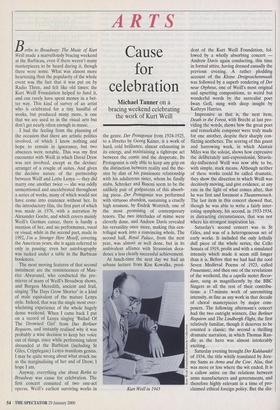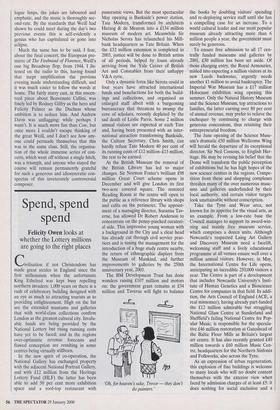ARTS
Cause for celebration
Michael Tanner on a bracing weekend celebrating the work of Kurt Weill erlin to Broadway: The Music of Kurt Weill made a marvellously bracing weekend at the Barbican, even if there weren't many masterpieces to be heard during it, though there were some. What was almost more heartening than the popularity of the whole event was the fact that it was put on by Radio Three, and felt like old times; the Kurt Weill Foundation helped to fund it, and can rarely have spent money in a bet- ter way. This kind of survey of an artist who is celebrated for a tiny handful of works, but produced many more, is one that we are used to in the visual arts but don't get nearly often enough in music.
I had the feeling from the planning of the occasion that there are artistic politics involved, of which I know nothing and hope to remain in ignorance; but two absences were notable. This was my first encounter with Weill in which David Drew was not involved, except as the deviser/ arranger of a couple of suites. And given the decisive nature of the partnership between Weill and Lotte Lenya — they did many one another twice — she was oddly unmentioned and uncelebrated throughout a series of works, many of which would not have come into existence without her. In the introductory film, the first part of which was made in 1978, with a narration by Alexander Goehr, and which covers mainly Weill's German career, there is hardly a mention of her, and no performance, vocal or visual; while in the second part, made in 1992, I'm a Stranger Here Myself, covering the American years, she is again referred to only in passing; even her autobiography was tucked under a table in the Barbican bookstore.
The most moving features of that second instalment are the reminiscences of Mau- rice Abravanel, who conducted the pre- mieres of many of Weill's Broadway shows, and Burgess Meredith, ancient and frail, singing 'The Days Grow Shorter' in a kind of male equivalent of the mature Lenya style. Indeed, that was the single most over- whelming experience of the whole hugely dense weekend. When I came back I put on a record of Lenya singing 'Ballad Of The Drowned Girl' from Das Berliner Requiem, and instantly realised why it was probably a wise decision to keep her voice out of things, since while performing talent abounded at the Barbican (including St Giles, Cripplegate) Lenya manifests genius. I may be quite wrong about what struck me as the marginalising of her and of Drew; I hope I am.
Anyway, everything else about Berlin to Broadway was cause for celebration. The first concert consisted of two one-act operas, Weill's earliest surviving works in the genre. Der Protagonist from 1924-1925, to a libretto by Georg Kaiser, is a work of hard, cold brilliance, almost exhausting in its energy, and maintaining a tightrope act between the comic and the desperate. Its Protagonist is only able to keep any grip on the distinction between reality and the the- atre by dint of his passionate relationship with his adulterous sister, whom he finally stabs. Schreker and Busoni seem to be the unlikely pair of godparents of this absorb- ing piece. Der Protagonist was performed with virtuoso abandon, sustaining a cruelly 'high tessitura, by Endrik Wottrich, one of the most promising of contemporary tenors. The two interludes of mime were cleverly done, and Andrew Davis revealed his versatility once more, making this cen- trifugal work into a convincing whole. The second half, Royal Palace, from the next year, was almost as well done, but in its ambivalent alliance with Straussian deca- dence a less clearly successful achievement.
At lunch-time the next day we had an urbane lecture from Kim KowaIke, presi- Kurt Weill in 1943 dent of the Kurt Weill Foundation, fol- lowed by a wholly absorbing concert — Andrew Davis again conducting, this time in formal attire, having dressed casually the previous evening. A rather plodding account of the Kleine Dreigroschenmusik was followed by a superb rendering of Der neue Orpheus, one of Weill's most original and upsetting compositions, to weird but wonderful words by the surrealist poet Iwan Go11, sung with deep insight by Kathryn Harries.
Impressive as that is, the next item, Death in the Forest, with Brecht at last pro- viding the words, shows how the great poet and remarkable composer were truly made for one another, despite their sharply con- flicting aesthetics. The scoring of this gaunt and harrowing work, in which Alastair Miles was the soloist, shows how expressive the deliberately anti-expressionist, Stravin- sky-influenced Weill was now able to be, with simple, stark means. Although neither of these works could be called dramatic, they show the direction in which Weill was decisively moving, and give evidence, at any rate in the light of what comes after, that he was first and foremost a Theatermensch. The last item in this concert showed that, though he was able to write a fairly inter- esting symphony, his second, in 1933-1934, in distracting circumstances, that was not where his strongest inspiration lay.
Saturday's second concert was in St Giles, and was of a heterogeneous set of early works. It included the only lethally dull piece of the whole series, the Cello Sonata of 1919, prolix and with a simulated intensity which made it seem still longer than it is. Before that we had had the cool Seven Medieval Poems of 1923, called Frauentanz, and then one of the revelations of the weekend, the a capella motet Recor- dare, sung as magnificently by the BBC Singers as all the rest of their contribu- tions: a 17-minute work of unremitting intensity, as fine as any work in that decade of choral masterpieces by major com- posers. The following afternoon's concert had the two outright winners, Das Berliner Requiem and The Lindbergh Flight, the first relatively familiar, though it deserves to be t ■ counted a classic; the second a thrilling dramatic narration, in which Thomas Ran- die as the hero was almost intolerably exciting.
Saturday evening brought Der Kuhhandel of 1934, the title wittily translated by Jere- . "2 my Sams as Arms and the Cow. Alas, that 1: was more or less where the wit ended. It is • a callow satire on the relations between - arms manufacturers and governments, and 2' therefore highly relevant in a time of pro- claimed ethical foreign policy. But the dia- logue limps, the jokes are laboured and emphatic, and the music is thoroughly sec- ond-rate. By the standards that Weill had shown he could meet during the day's two previous events this is self-evidently a genius who has capitulated or gone into eclipse.
Much the same has to be said, I fear, about the final concert, the European pre- miere of The Firebrand of Florence, Weill's one big Broadway flop, from 1944. I lis- tened on the radio to this, having found that inept amplification the previous evening made understanding difficult, and it was much easier to follow the words at home. The fairly starry cast, in this uncen- tred piece about Benvenuto Cellini, was finely led by Rodney Gilfry as the hero and Felicity Palmer as the Duchess whose ambition is to seduce him. And Andrew Davis was unflagging; while perhaps I wasn't. It is much more fun than Cow, but once more I couldn't escape thinking of the great Weill, and I don't see how any- one could persuade themselves that this was in the same class. Still, the organisa- tion of the whole immense series of con- certs, which went off without a single hitch, was a triumph, and anyone who stayed the course will remain permanently grateful for such a generous and idiosyncratic con- spectus of this inveterately controversial composer.



















































































 Previous page
Previous page